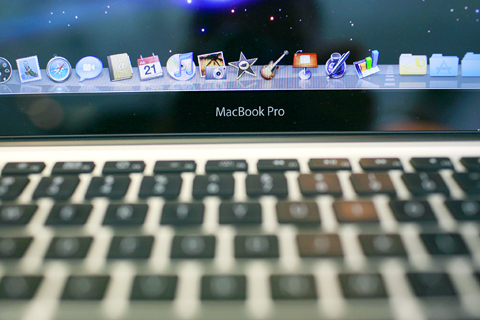Apple Inc’s quarterly profit blew past Wall Street forecasts thanks to strong sales of Macs and iPhones and higher-than-expected gross margins, boosting its shares 4 percent on Tuesday.
The company continued to defy the global recession with a solid 13 percent jump in fiscal third-quarter net profit. It sold more than seven times as many iPhones — 5.2 million units of its latest signature device — as the year-ago period.
“The numbers are great. Their gross profits continue to surprise people and there is a return to product momentum ... a return to growth in the Mac business,” said Andy Hargreaves, an analyst at Pacific Crest Securities. “And then the iPhone is doing tremendously well and that is a potent combination.”

PHOTO: REUTERS
Apple reported a net profit of US$1.23 billion, or US$1.35 a share, for its fiscal third quarter ended June 27, up from US$1.07 billion, or US$1.19 a share, in the year-ago period.
Earnings per share beat by far the average Wall Street forecast of US$1.18 according to Reuters Estimates, and topped even the most bullish “whisper” numbers of US$1.30 to US$1.34.
Revenue rose 12 percent to US$8.3 billion in the June quarter, versus analysts’ average estimate of US$8.2 billion.
Sales of Macs and iPhones both beat analysts’ expectations, helped by product refreshes and lower prices, while iPod shipments were toward the low end of forecasts.
Apple said it sold 2.6 million Macs, up 4 percent from a year ago, and 5.2 million iPhones in the June quarter, during which the company launched its third-generation iPhone 3GS and cut the price on the second-generation model to US$99.
Although the smartphone segment continues to grow more crowded with competitors, chief operating officer Tim Cook said on a conference call the company is “years ahead of other people” in its competitive position.
The install base for the iPhone and the iPod Touch — which share operating systems — is now 45 million, Apple said.
“The iPhone is the biggest driver right now, because the profitability is really high,” said Frost & Sullivan analyst Ronald Gruia. “It’s been an absolute success.”
Yet there had been some concern about margin pressure heading into the results, given the product price cuts and the trend of higher component costs.
Apple posted a gross margin of 36.3 percent, above the 34 percent some analysts predicted. That compared with 36.4 percent in the last quarter and 34.8 percent a year ago. The company saw margins at 34 percent in the September quarter.
Apple said component costs rose, but not as much as expected and it spent less than it planned in several areas.
The company issued a typically conservative outlook for the current quarter, forecasting earnings of US$1.18 to US$1.23 a share on revenue of US$8.7 billion to US$8.9 billion.

MORE VISITORS: The Tourism Administration said that it is seeing positive prospects in its efforts to expand the tourism market in North America and Europe Taiwan has been ranked as the cheapest place in the world to travel to this year, based on a list recommended by NerdWallet. The San Francisco-based personal finance company said that Taiwan topped the list of 16 nations it chose for budget travelers because US tourists do not need visas and travelers can easily have a good meal for less than US$10. A bus ride in Taipei costs just under US$0.50, while subway rides start at US$0.60, the firm said, adding that public transportation in Taiwan is easy to navigate. The firm also called Taiwan a “food lover’s paradise,” citing inexpensive breakfast stalls

TRADE: A mandatory declaration of origin for manufactured goods bound for the US is to take effect on May 7 to block China from exploiting Taiwan’s trade channels All products manufactured in Taiwan and exported to the US must include a signed declaration of origin starting on May 7, the Bureau of Foreign Trade announced yesterday. US President Donald Trump on April 2 imposed a 32 percent tariff on imports from Taiwan, but one week later announced a 90-day pause on its implementation. However, a universal 10 percent tariff was immediately applied to most imports from around the world. On April 12, the Trump administration further exempted computers, smartphones and semiconductors from the new tariffs. In response, President William Lai’s (賴清德) administration has introduced a series of countermeasures to support affected

CROSS-STRAIT: The vast majority of Taiwanese support maintaining the ‘status quo,’ while concern is rising about Beijing’s influence operations More than eight out of 10 Taiwanese reject Beijing’s “one country, two systems” framework for cross-strait relations, according to a survey released by the Mainland Affairs Council (MAC) on Thursday. The MAC’s latest quarterly survey found that 84.4 percent of respondents opposed Beijing’s “one country, two systems” formula for handling cross-strait relations — a figure consistent with past polling. Over the past three years, opposition to the framework has remained high, ranging from a low of 83.6 percent in April 2023 to a peak of 89.6 percent in April last year. In the most recent poll, 82.5 percent also rejected China’s

PLUGGING HOLES: The amendments would bring the legislation in line with systems found in other countries such as Japan and the US, Legislator Chen Kuan-ting said Democratic Progressive Party (DPP) Legislator Chen Kuan-ting (陳冠廷) has proposed amending national security legislation amid a spate of espionage cases. Potential gaps in security vetting procedures for personnel with access to sensitive information prompted him to propose the amendments, which would introduce changes to Article 14 of the Classified National Security Information Protection Act (國家機密保護法), Chen said yesterday. The proposal, which aims to enhance interagency vetting procedures and reduce the risk of classified information leaks, would establish a comprehensive security clearance system in Taiwan, he said. The amendment would require character and loyalty checks for civil servants and intelligence personnel prior to